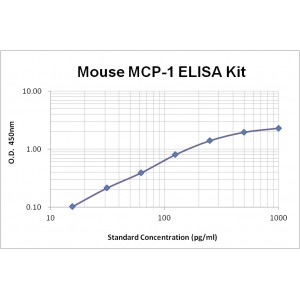More info
Assay Range | 15.6 - 1,000 pg/mL |
Sensitivity | 6.0 pg/mL |
Size | 96T |
Storage | Store at 2 - 8ºC. Keep reconstituted standard and detection Ab at -20 ºC |
Assay Principle | Sandwich ELISA |
Sample Volume | 100 µL final volume, dilution factor varies on samples |
Detection Method | Chromogenic |
Kit Components
1. Recombinant Mouse MCP-1 standard: 2 vials
2. One 96-well plate coated withMouse MCP-1 Ab
3. Sample diluent buffer: 12 mL — 2
4. Detection antibody: 130 µL , dilution 1:100
5. Streptavidin-HRP: 130 µL, dilution 1:100
6. Antibody diluent buffer: 12 mL x1
7. Streptavidin-HRP diluent buffer: 12 mL x1
8. TMB developing agent: 10 mL x1
9. Stop solution: 10 mL x1
10. Washing solution (20x): 25 mL x1
Background
Mouse monocyte chemotactic protein 1 (MCP-1), also known as platelet-derived growth factor-inducible protein JE or small- inducible cytokine A2, is a member of the MCP/eotaxin group in the CC chemokine superfamily. In the MCP group, five human (MCP-1, 2, 3, 4 and eotaxin) and four mouse (JE/MCP-1, MARC/MCP-3, MCP-5, and eotaxin) proteins have been identified so far. Mature human MCP-1 shows 55%, 59%, and 66% amino acid (aa) sequence identity with mouse JE, MARC, and MCP-5, respectively. Mouse MCP-1 is synthesized as a 148 aa precursor protein with a 23 aa signal peptide and a 125 aa mature protein. Compared to mature human MCP-1, mouse MCP-1 has a 49 aa residue carboxy-terminal extension enriched with serine and threonine residues.
Mouse MCP-1 is broadly expressed in a variety of cells such as fibroblasts, astrocytes, epithelial cells, macrophages, mast cells, endothelial cells, osteoblasts and ameloblasts. The expression of mouse MCP-1 is induced in response to various inflammatory stimuli, such as, viruses, LPS, TNF-α, IL-1, IFN-γ, and PDGF. The activities of mouse MCP-1is transduced by the mouse CC chemokine receptor CCR2, which shows 80% aa sequence identity with the human MCP-1 receptor CCR2B. Mouse MCP-1 is a potent chemoattractant for monocytes/macrophages and lymphocytes. It also plays a role in the regulation of Th1/Th2 lymphocyte differentiation and of Th2 development.


